| Listing 1 - 10 of 30 | << page >> |
Sort by
|
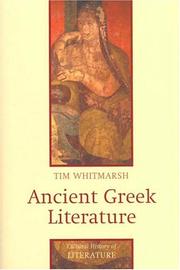
ISBN: 0745627927 0745627919 9780745627922 9780745627915 Year: 2004 Volume: *1 Publisher: Cambridge Polity Press
Abstract | Keywords | Export | Availability | Bookmark
 Loading...
Loading...Choose an application
- Reference Manager
- EndNote
- RefWorks (Direct export to RefWorks)
Classical Greek literature --- Greek literature --- Littérature grecque --- History and criticism. --- Histoire et critique --- Greece --- Grèce --- Civilization --- Civilisation --- Littérature grecque --- Grèce --- History and criticism
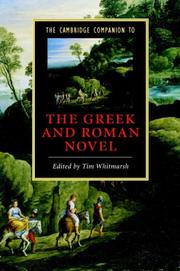
ISBN: 9780521865906 0521865905 9780521684880 0521684889 1139001833 1139817671 9781139001830 Year: 2008 Volume: *109 Publisher: Cambridge: Cambridge university press,
Abstract | Keywords | Export | Availability | Bookmark
 Loading...
Loading...Choose an application
- Reference Manager
- EndNote
- RefWorks (Direct export to RefWorks)
The Greek and Roman novels of Petronius, Apuleius, Longus, Heliodorus and others have been cherished for millennia, but never more so than now. The Cambridge Companion to the Greek and Roman Novel contains nineteen original essays by an international cast of experts in the field. The emphasis is upon the critical interpretation of the texts within historical settings, both in antiquity and in the later generations that have been and continue to be inspired by them. All the central issues of current scholarship are addressed: sexuality, cultural identity, class, religion, politics, narrative, style, readership and much more. Four sections cover cultural context of the novels, their contents, literary form, and their reception in classical antiquity and beyond. Each chapter includes guidance on further reading. This collection will be essential for scholars and students, as well as for others who want an up-to-date, accessible introduction into this exhilarating material.
Fiction --- Classical literature --- Classical fiction --- Roman ancien --- Littérature ancienne --- History and criticism. --- History and criticism --- Histoire et critique --- Littérature grecque --- --Littérature latine --- --Influence --- --Thème --- --History and criticism --- Littérature ancienne --- Greek fiction --- Latin fiction --- Classical fiction - History and criticism --- Littérature latine --- Influence --- Thème --- Roman antique
Book
ISBN: 9780307958327 9780307958334 0307958329 Year: 2015 Publisher: New York: Knopf,
Abstract | Keywords | Export | Availability | Bookmark
 Loading...
Loading...Choose an application
- Reference Manager
- EndNote
- RefWorks (Direct export to RefWorks)
"How new is atheism? Although adherents and opponents alike today present it as an invention of the European Enlightenment, when the forces of science and secularism broadly challenged those of faith, disbelief in the gods, in fact, originated in a far more remote past. In Battling the Gods, Tim Whitmarsh journeys into the ancient Mediterranean, a world almost unimaginably different from our own, to recover the stories and voices of those who first refused the divinities. Homer's epic poems of human striving, journeying, and passion were ancient Greece's only "sacred texts," but no ancient Greek thought twice about questioning or mocking his stories of the gods. Priests were functionaries rather than sources of moral or cosmological wisdom. The absence of centralized religious authority made for an extraordinary variety of perspectives on sacred matters, from the devotional to theatheos, or "godless." Whitmarsh explores this kaleidoscopic range of ideas about the gods, focusing on the colorful individuals who challenged their existence. Among these were some of the greatest ancient poets and philosophers and writers, as well as the less well known: Diagoras of Melos, perhaps the first self-professed atheist; Democritus, the first materialist; Socrates, executed for rejecting the gods of the Athenian state; Epicurus and his followers, who thought gods could not intervene in human affairs; the brilliantly mischievous satirist Lucian of Samosata. Before the revolutions of late antiquity, which saw the scriptural religions of Christianity and Islam enforced by imperial might, there were few constraints on belief. Everything changed, however, in the millennium between the appearance of the Homeric poems and Christianity's establishment as Rome's state religion in the fourth century AD. As successive Greco-Roman empires grew in size and complexity, and power was increasingly concentrated in central capitals, states sought to impose collective religious adherence, first to cults devoted to individual rulers, and ultimately to monotheism. In this new world, there was no room for outright disbelief: the label "atheist" was used now to demonize anyone who merely disagreed with the orthodoxy--and so it would remain for centuries." -- Publisher's description
Atheism --- Christianity and atheism. --- Athéisme --- Christianisme et athéisme --- History. --- Histoire --- Greece --- Grèce --- Religion. --- Religion --- Christianity and atheism --- History --- Religion grecque --- Atheism. --- Greece. --- Athéisme --- Christianisme et athéisme --- Grèce --- Religion grecque. --- Christianisme et athéisme. --- Atheism - Greece - History --- Greece - Religion
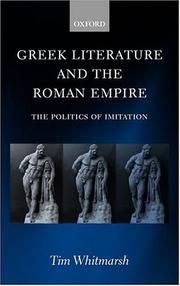
ISBN: 0199240353 9780199240357 Year: 2001 Publisher: Oxford: Oxford university press,
Abstract | Keywords | Export | Availability | Bookmark
 Loading...
Loading...Choose an application
- Reference Manager
- EndNote
- RefWorks (Direct export to RefWorks)
Beschaving [Grieks-Romeinse ] --- Civilisation gréco-romaine --- Civilization [Greco-Roman ] --- Cultuur [Grieks-Romeinse ] --- Grieks-Romeinse beschaving --- Grieks-Romeinse cultuur --- Mimésis dans la littérature --- Balkan literature --- Byzantine literature --- -Civilization, Greco-Roman. --- -Greco-Roman civilization --- Greek literature --- -Greek literature --- -Civilization, Greco-Roman --- Hellenism --- Politics and literature --- -Politics and literature --- Literature --- Literature and politics --- History and criticism --- Appreciation --- -History --- Political aspects --- Rome --- -Greece --- -Rome --- -Rim --- Roman Empire --- Roman Republic (510-30 B.C.) --- Romi (Empire) --- Griechenland --- Grèce --- Hellas --- Yaṿan --- Vasileion tēs Hellados --- Hellēnikē Dēmokratia --- République hellénique --- Royaume de Grèce --- Kingdom of Greece --- Hellenic Republic --- Ancient Greece --- Ελλάδα --- Ellada --- Ελλάς --- Ellas --- Ελληνική Δημοκρατία --- Ellēnikē Dēmokratia --- Elliniki Dimokratia --- Grecia --- Grčija --- Hellada --- History --- -Relations --- Hellenism. --- History and criticism. --- Civilization, Greco-Roman --- Greco-Roman civilization --- Civilization, Classical --- Classical literature --- Classical philology --- Greek philology --- Greece --- Rim --- Byzantine Empire --- Rome (Italy) --- اليونان --- يونان --- al-Yūnān --- Yūnān --- 希腊 --- Xila --- Греция --- Gret︠s︡ii︠a︡ --- Relations --- Civilization, Greco-Roman. --- History. --- Mimesis in literature --- Emperors --- Littérature grecque --- Politique et littérature --- Mimésis dans la littérature --- Empereurs --- Duties --- Histoire et critique --- Histoire --- Devoirs --- Empire, 30 B.C.-284 A.D. --- Politics and government --- 146 B.C.-323 A.D. --- To 500 --- Greek literature - Rome - History and criticism. --- Politics and literature - Greece - History - To 1500. --- Politics and literature - Rome - History. --- Greek literature - Appreciation - Rome.
Book
ISBN: 9780199742653 0199742650 0199876592 0190880791 9780199876594 Year: 2018 Publisher: New York Oxford University Press
Abstract | Keywords | Export | Availability | Bookmark
 Loading...
Loading...Choose an application
- Reference Manager
- EndNote
- RefWorks (Direct export to RefWorks)
Some of the world's earliest large-form fictional narratives--what would today be called novels-are found in ancient Greece. Dating back to the first century CE, these narratives contain many of the elements common to the novelistic genre, for instance, the joining, separation, and reunion of two lovers. These ancient works have often been heralded as the ancestors of the modern novel; but what can we say of the origins of the Greek novel itself?This book argues that whereas much of Greek literature was committed to a form of cultural purism, presenting itself as part of a continuous tradition reaching back to the founding fathers within the tradition, the novel reveled in cultural hybridity. The earliest Greek novelistic literature combined Greek and non-Greek traditions. More than this, however, it also often self-consciously explored its own hybridity by focusing on stories of cultural hybridization, or what we would now call "mixed-race" relations. This book is thus not a conventional account of the origins of the Greek novel: it is not an attempt to pinpoint the moment of invention, and to trace its subsequent development in a straight line. Rather, it makes a virtue of the murkiness, or "dirtiness," of the origins of the novel: there is no single point of creation, no pure tradition, only transgression and transformation. The novel thus emerges as an outlier within the Greek literary corpus: a form of literature written in Greek, but not always committing to Greek cultural identity. Dirty Love focuses particularly on the relationship between Persian, Egyptian, Jewish and Greek literature, and explores such texts as Ctesias' Persica, Joseph and Aseneth, the Alexander Romance, and the tale of Ninus and Semiramis. It will appeal not only to those interested in Greek literary history, but also to readers of near eastern and biblical literature.
Greek fiction --- Greek fiction. --- History and criticism. --- E-books
Book
ISBN: 0520957024 9780520957022 0520276817 9780520276819 9780520276819 0520344588 Year: 2013 Publisher: Berkeley University of California Press
Abstract | Keywords | Export | Availability | Bookmark
 Loading...
Loading...Choose an application
- Reference Manager
- EndNote
- RefWorks (Direct export to RefWorks)
The "Second Sophistic" traditionally refers to a period at the height of the Roman Empire's power that witnessed a flourishing of Greek rhetoric and oratory, and since the 19th century it has often been viewed as a defense of Hellenic civilization against the domination of Rome. This book proposes a very different model. Covering popular fiction, poetry and Greco-Jewish material, it argues for a rich, dynamic, and diverse culture, which cannot be reduced to a simple model of continuity. Shining new light on a series of playful, imaginative texts that are left out of the traditional accounts of Greek literature, Whitmarsh models a more adventurous, exploratory approach to later Greek culture. Beyond the Second Sophistic offers not only a new way of looking at Greek literature from 300 BCE onwards, but also a challenge to the Eurocentric, aristocratic constructions placed on the Greek heritage. Accessible and lively, it will appeal to students and scholars of Greek literature and culture, Hellenistic Judaism, world literature, and cultural theory.
Greek literature --- Balkan literature --- Byzantine literature --- Classical literature --- Classical philology --- Greek philology --- History and criticism. --- Greek literature -- Rome -- History and criticism.. --- Greek literature -- History and criticism. --- ancient literature. --- aristocratic constructions. --- classics. --- different model. --- diverse culture. --- engaging. --- exploratory approach. --- greco-jewish material. --- greek culture. --- greek heritage. --- greek literature. --- greek oratory. --- greek rhetoric. --- hellenic civilization. --- hellenistic judaism. --- historical. --- history. --- literary. --- roman empire. --- rome. --- second sophistic.
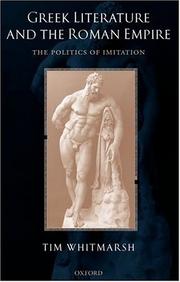
ISBN: 0199271372 Year: 2004 Publisher: Oxford : Oxford university press,
Abstract | Keywords | Export | Availability | Bookmark
 Loading...
Loading...Choose an application
- Reference Manager
- EndNote
- RefWorks (Direct export to RefWorks)
Book
ISBN: 9780571279302 Year: 2016 Publisher: London Faber & Faber
Abstract | Keywords | Export | Availability | Bookmark
 Loading...
Loading...Choose an application
- Reference Manager
- EndNote
- RefWorks (Direct export to RefWorks)
Digital
ISBN: 9780511975332 Year: 2011 Publisher: Cambridge Cambridge University Press
Abstract | Keywords | Export | Availability | Bookmark
 Loading...
Loading...Choose an application
- Reference Manager
- EndNote
- RefWorks (Direct export to RefWorks)
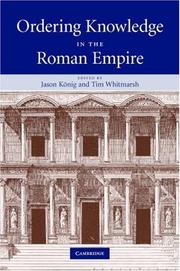
ISBN: 9780521296939 9780521859691 0521859697 9780511551062 9780511508103 0511508107 9780511504075 0511504071 0511551061 1107177618 9786612058233 0511507445 1282058231 051150876X 051150621X 0521296935 Year: 2007 Publisher: Cambridge: Cambridge university press,
Abstract | Keywords | Export | Availability | Bookmark
 Loading...
Loading...Choose an application
- Reference Manager
- EndNote
- RefWorks (Direct export to RefWorks)
The Romans commanded the largest and most complex empire the world had ever seen, or would see until modern times. The challenges, however, were not just political, economic and military: Rome was also the hub of a vast information network, drawing in worldwide expertise and refashioning it for its own purposes. This fascinating collection of essays considers the dialogue between technical literature and imperial society, drawing on, developing and critiquing a range of modern cultural theories (including those of Michel Foucault and Edward Said). How was knowledge shaped into textual forms, and how did those forms encode relationships between emperor and subjects, theory and practice, Roman and Greek, centre and periphery? Ordering Knowledge in the Roman Empire will be required reading for those concerned with the intellectual and cultural history of the Roman Empire, and its lasting legacy in the medieval world and beyond.
Knowledge, Theory of --- History. --- Epistemology --- Theory of knowledge --- Philosophy --- Psychology --- History --- Knowledge management --- Learning and scholarship --- Writing --- Rome --- Intellectual life --- Théorie de la connaissance --- Vie intellectuelle --- Information organization --- Knowledge, Sociology of. --- Knowledge, Theory of (Sociology) --- Sociology of knowledge --- Communication --- Public opinion --- Sociology --- Social epistemology --- Information storage and retrieval --- Organization of information --- Information science --- Information storage and retrieval systems --- Rim --- Roman Empire --- Roman Republic (510-30 B.C.) --- Romi (Empire) --- Byzantine Empire --- Rome (Italy) --- Intellectual life. --- Arts and Humanities --- Knowledge management - Rome --- Learning and scholarship - Rome --- Writing - History - To 1500 --- Rome - Intellectual life
| Listing 1 - 10 of 30 | << page >> |
Sort by
|

 Search
Search Feedback
Feedback About UniCat
About UniCat  Help
Help News
News